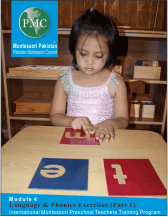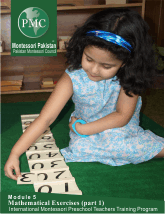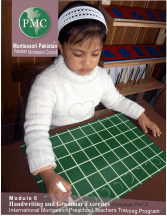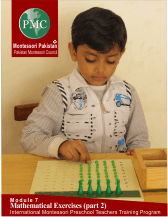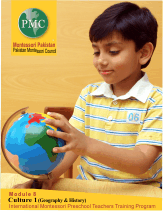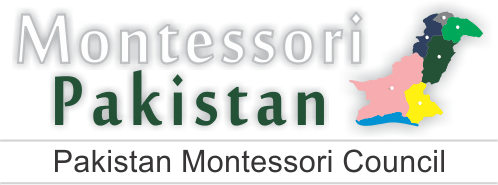Premium Montessori Training Manuals
Your lifetime teaching resource
Upon enrollment in our Distance Montessori (Preschool) Early Childhood (3 – 6) Diploma Program, every student receives nine premium-quality training manuals tailored for distance learning needs. These manuals are meticulously designed to include illustrations or pictures for each step of every activity, accompanied by explanations in simple English. As you navigate through these manuals, you’ll feel like you’re being guided by an expert Montessori trainer in a dedicated training center.
Our manuals serve as lifelong resources, providing comprehensive and thorough guidance. Unlike bulky and cumbersome alternatives, they are compact, lightweight, and visually appealing, making them easy to handle. Each manual includes assignments that you can conveniently submit through our online learning management system. Upon enrollment, these manuals are promptly shipped to you via express post.
Containing the most comprehensive Montessori Early Childhood (3 to 6) Curriculum, our manuals feature hundreds of classroom activities, each meticulously illustrated. Printed in full color on top-quality paper, they stand out as the best Montessori training albums/manuals available worldwide.
You can explore sample pages and review index pages of each curriculum manual below to familiarize yourself with their content.
Module 1: Introduction to Montessori
This module provides an overview of the Montessori method and its distinctive features. It begins by delving into the life and contributions of Dr. Maria Montessori, the founder of this educational approach. Subsequently, it explores her educational philosophy and the fundamental components of the Montessori method. Topics such as sensitive periods, the preparation of the Montessori environment, and the significance of mixed-age groups are thoroughly discussed in this guidebook. Additionally, it serves as a roadmap for navigating through the remaining 11 modules of the course.
- – Key topics covered in this manual include:
- – Introduction to Dr. Montessori’s Life, Works, Method, and Philosophy
- – Key Montessori Concepts (Prepared Environment, Freedom, Sensitive Periods, Mixed Age Groups, etc.)
- – Child Development
- – Your Role as a Montessori Directress
- – Presentation of Montessori Lessons
- – Organizing and Managing a Montessori Classroom
Module 2: Montessori Exercises of Practical Life (EPL)
Exercises of Practical Life (EPL) encompass everyday tasks performed by adults in their environment. These activities are authentic and occur in real-life situations. When introduced to children at the appropriate developmental stage, practical life activities empower them to accomplish tasks independently, fostering a lifelong sense of self-reliance.
This manual outlines a diverse range of step-by-step activities, from simple tasks like pouring water from a jug to more complex ones such as washing dishes. These exercises cater to the child’s natural inclination to engage in meaningful tasks and become active participants in their family and society. By encouraging independence, instilling a love for work, boosting self-esteem, enhancing motor skills, instilling good habits, and contributing to the child’s overall normalization, these activities play a crucial role in the child’s development.
Module 3: Montessori Exercises of Sensorial Development
Our senses are crucial in shaping our understanding of the world around us, serving as vital channels through which we receive external information. During the child’s formative years, especially during the sensitive period for sensory development, providing ample opportunities for sensory interaction with the environment is essential.
This comprehensive manual delves into the full spectrum of Montessori sensorial exercises. With fully colored, step-by-step illustrations and pictures, it covers various areas, including visual, tactile, olfactory, gustatory, and auditory exercises. These exercises are designed to stimulate the child’s senses, facilitating their exploration and understanding of the world in a holistic manner.
Module 4: Montessori Language (Manual A)
The Montessori language curriculum adopts a holistic approach, providing developmentally appropriate activities and materials to support various aspects of language development, including phonics, reading, writing, grammar, and oral language.
This manual focuses on structured activities designed to guide children through the progression of phonics. It offers a comprehensive plan for practicing the 44 phonetic sounds of the English language, along with their 144 different alphabetic representations. Additionally, it includes activities to help children progress from three-lettered phonetic words (pink level) to longer phonetic words (blue level), high-frequency words (sight words), phonogramic words (green level), and ultimately total reading.
Furthermore, the manual introduces the use of metal insets to help develop fine motor skills necessary for pencil control. Additionally, sandpaper letters are utilized to familiarize children with the correct formation of alphabet letters. These hands-on activities play a crucial role in supporting children’s language development and literacy skills.
Module 5: Montessori Mathematical Exercises (Manual A)
This manual explores Dr. Montessori’s innovative Montessori mathematics materials, which continue to impress mathematicians to this day. These materials, including number rods, sandpaper numbers, spindle boxes, number cards, and counters, provide hands-on learning experiences for children to grasp concepts such as counting, quantity identification, and numeral association up to the number ten.
The manual also explores exercises related to the Decimal System group, typically conducted with golden bead materials and corresponding number cards. Through these exercises, children engage in enriched concrete experiences involving addition, multiplication, subtraction, and division.
Additionally, the manual covers exercises in the Linear Counting Group, which enable children to progress in counting to one hundred and eventually to one thousand. These activities foster a deeper understanding of numerical concepts and lay a strong foundation for mathematical proficiency.
Module 6: Montessori Language (Manual B)
Montessori children often achieve remarkable linguistic and literacy milestones before the age of six, leaving people astonished by their accomplishments.
This manual focuses on writing, sorting, and grammar exercises within the Montessori language curriculum. Activities involving chalkboards and alphabet sorting are intertwined to enhance the child’s writing skills. Additionally, the manual introduces the function of words, acquainting the child with different forms of speech using tangible symbols. Through farmhouse exercises, children learn to use words effectively in phrases and sentences, further advancing their understanding of language structure and grammar.
Module 7: Montessori Mathematical Exercises (Manual B)
This manual delves deeper into advanced Montessori Mathematics activities, building upon the foundation laid by previous materials. Activities involving bead chains prepare children for extensive linear and skip counting, while games like snake games, multiplication bead bars, bead stairs, small number rods, and the stamp game take them through the four operations—addition, subtraction, multiplication, and division—in a more abstract manner.
Additionally, the manual includes exercises for the memorization of tables, such as the multiplication board, unit division boards, and addition, multiplication, subtraction, and division charts. These activities aim to reinforce mathematical concepts and develop fluency in arithmetic operations.
Module 8: Montessori Cultural Exercises 1 – Geography and History Exercises
This manual is designed to provide concrete activities that enhance children’s understanding of these subjects. By engaging with tangible materials, children develop their personalities, gain insights into their own culture, and become independent, contributing members of society. Through hands-on experiences, children not only acquire knowledge but also cultivate a deep appreciation for the world around them.
Module 9: Montessori Cultural Exercises 2 – Zoology, Botany and Science Experiments
During their early years, children naturally gravitate towards all aspects of nature, including plants and animals. Cultivating a strong connection with nature and providing relevant experiences is crucial for their holistic development. By engaging with the natural world, children develop a sense of wonder, curiosity, and respect for their environment. These experiences promote physical, emotional, and cognitive growth, nurturing their innate curiosity and fostering a lifelong appreciation for the beauty and diversity of nature.
This module contains a series of developmentally appropriate zoology and botany activities along with science experiments.

Module 10: Culture C (Handwork)
Children are inherently drawn to arts and crafts, expressing their creativity and imagination through various artistic endeavors. This manual offers a rich collection of nearly a hundred art and handwork activities, ranging from cutting and collage to weaving and origami.
Through these activities, children explore different artistic techniques, develop fine motor skills, and unleash their creativity. Engaging in arts and crafts not only provides children with a creative outlet but also promotes self-expression, problem-solving, and confidence-building. Whether it’s painting, sculpting, or crafting, these activities encourage children to experiment, innovate, and enjoy the process of creating something unique and meaningful.
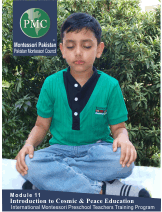
Module 11: Montessori Cosmic & Peace Education
Central to Dr. Montessori’s philosophy was the idea that spiritual development is paramount, representing the ultimate goal of education. By instilling in children an understanding of their place in the world and their connection to others, Cosmic Peace Education aims to cultivate compassion, empathy, and a sense of responsibility towards all living beings. Through age-appropriate activities and discussions, children are encouraged to explore concepts of interconnectedness, empathy, and peace, laying the foundation for a more harmonious and compassionate society.

Module 12: Montessori School Administration
This module provides you with the necessary knowledge, skills, and tools to establish, organize, and oversee your Montessori environment effectively. Through comprehensive guidance and practical insights, you will learn how to create an environment that fosters independence, exploration, and meaningful learning experiences for children. From setting up the physical space to implementing Montessori principles and techniques, this module equips you with the essential resources to create a nurturing and enriching environment conducive to children’s holistic development.





